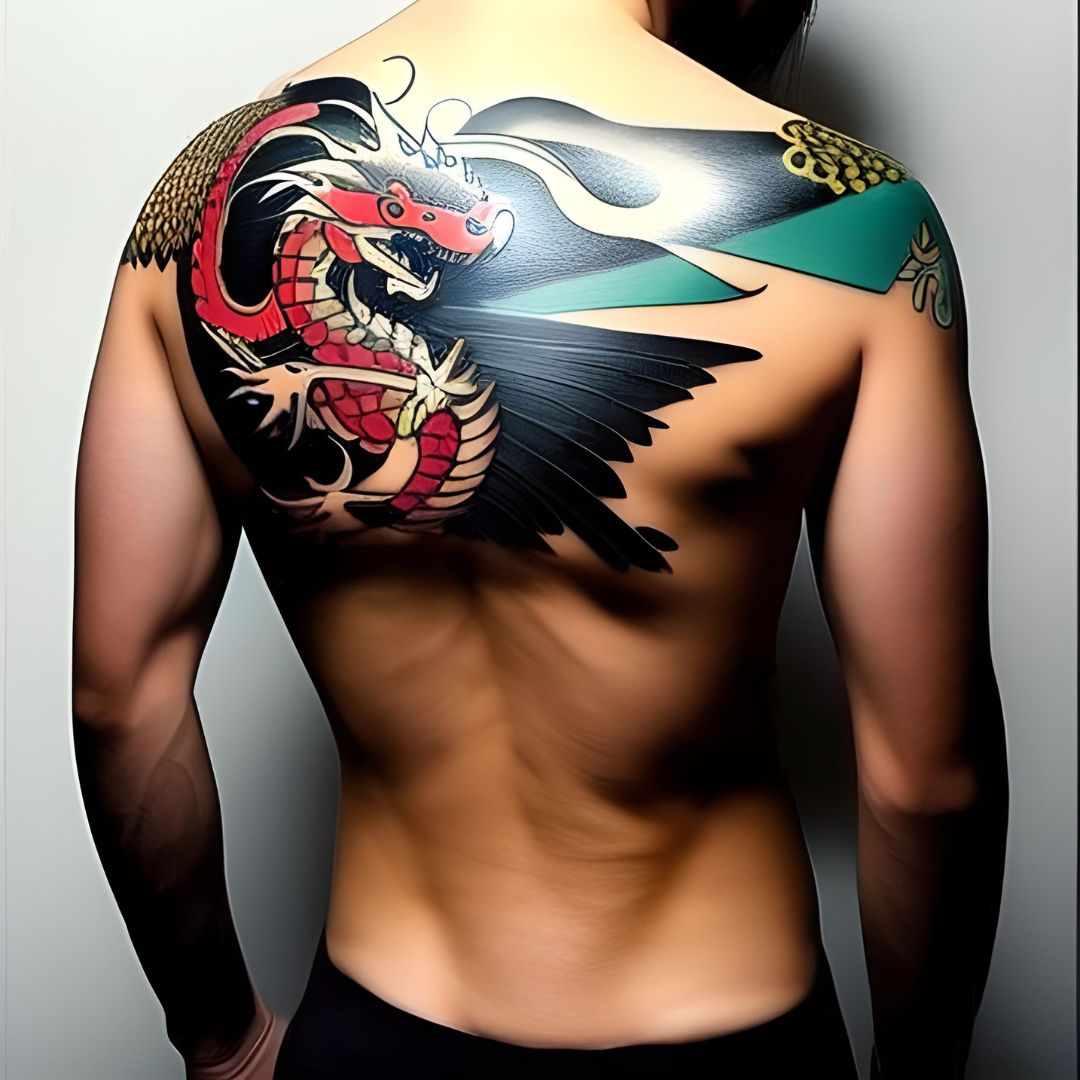
Tattoos have served as a timeless means of self-expression, a canvas for narratives woven into skin, transcending cultures and generations. Among the myriad tattoo motifs, the Japanese dragon stands as an icon steeped in mystique and significance. From its ancient origins in Japanese culture to its widespread popularity across the world today, the Japanese dragon tattoo holds a unique place in the realm of body art. This exploration delves into the history, symbolism, and enduring appeal of Japanese dragon tattoos, shedding light on their effectiveness and benefits.
History and Culture of Dragon Tattoo:
The origins of the Japanese dragon tattoo can be traced back to the annals of Japan’s rich history and mythology. In the land of the rising sun, the dragon, or “ryu,” is an emblematic creature associated with a multitude of virtues. These mythical beings have traversed the pages of ancient texts, folklore, and artwork for centuries, capturing the imagination of generations. Intricately interwoven into Japanese culture, these symbols represent both the tangible and the intangible aspects of existence.
Significance and Symbolism:
At the heart of the Japanese dragon tattoo lies a tapestry of symbolism that weaves threads of power, wisdom, and spiritual significance. The dragon’s sinuous form symbolizes water, and in turn, the life-sustaining qualities it brings. As a water deity, the dragon becomes a guardian of rain and blessings, ensuring prosperity for those who revere it. The dragon’s ability to transition from the sea to the sky signifies transformation and adaptability – qualities that resonate deeply with individuals seeking change and personal growth.
Furthermore, the dragon’s connection to both land and water mirrors its role as a mediator between opposing forces. This balance between realms lends it an aura of harmony and unity, making it a symbol of cosmic equilibrium. Additionally, the dragon’s scales, often depicted in intricate detail, symbolize protection—a shield against malevolent forces that seek to disrupt this harmony.
Effectiveness and Benefits:
The allure of the Japanese dragon tattoo lies not only in its symbolism but also in its effectiveness as a tool for empowerment and self-identity. For those who choose to don this iconic design, the tattoo becomes an embodiment of personal attributes they aspire to embody. It can serve as a constant reminder of the strength and courage needed to overcome challenges, the wisdom to navigate life’s complexities, and the adaptability to embrace change.
Furthermore, the tattoo’s aesthetic appeal, with its intricate details and vibrant colors, creates a mesmerizing visual statement. The dragon’s sinuous curves and dynamic postures capture attention, making it a conversation starter and a reflection of the wearer’s individuality. The act of adorning one’s body with a Japanese dragon tattoo designs is akin to donning a piece of living artwork, a fusion of ancient tradition and modern expression.
Certainly, I can provide you with brief descriptions for each of the headings you’ve listed:
Japanese Dragon and Skull Tattoo:
A fusion of life and death, this tattoo juxtaposes the dragon’s vitality with the skull’s symbolism of mortality.
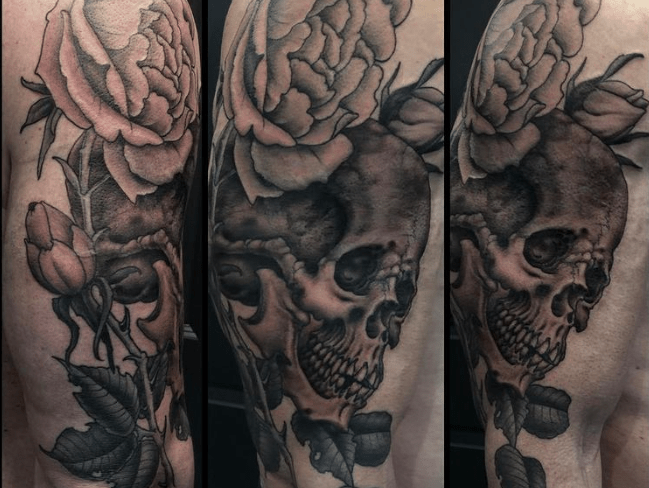
Japanese Dragon and Samurai Tattoo:
Combining the dragon’s power with the samurai’s code of honor, this tattoo represents strength, discipline, and loyalty.
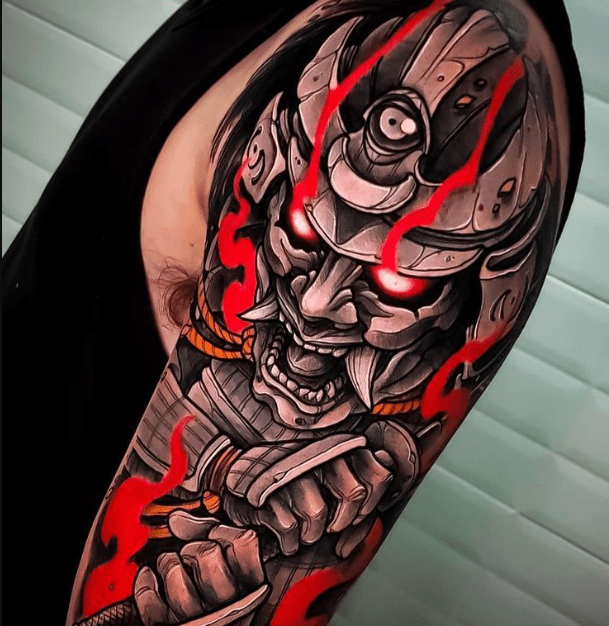
Japanese Dragon Forearm Tattoo:
Forearm tattoos offer a more compact canvas for dragon motifs, allowing wearers to display their chosen symbolism with elegance.
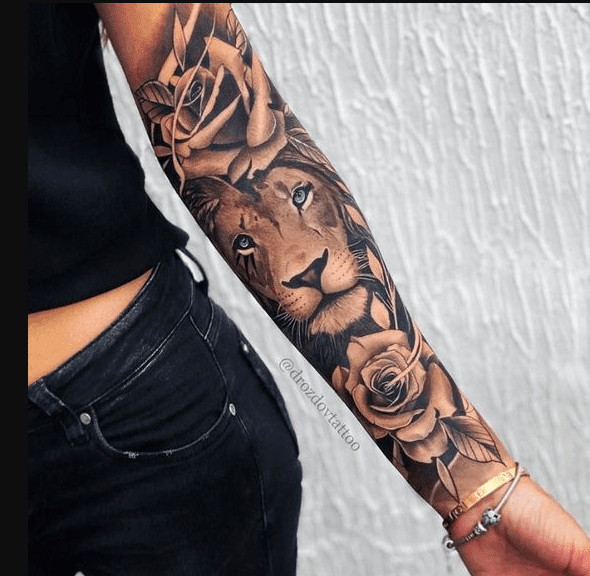
Cherry Blossom Japanese Dragon Tattoo:
Marrying the dragon’s power with the delicacy of cherry blossoms, this tattoo juxtaposes strength and vulnerability.
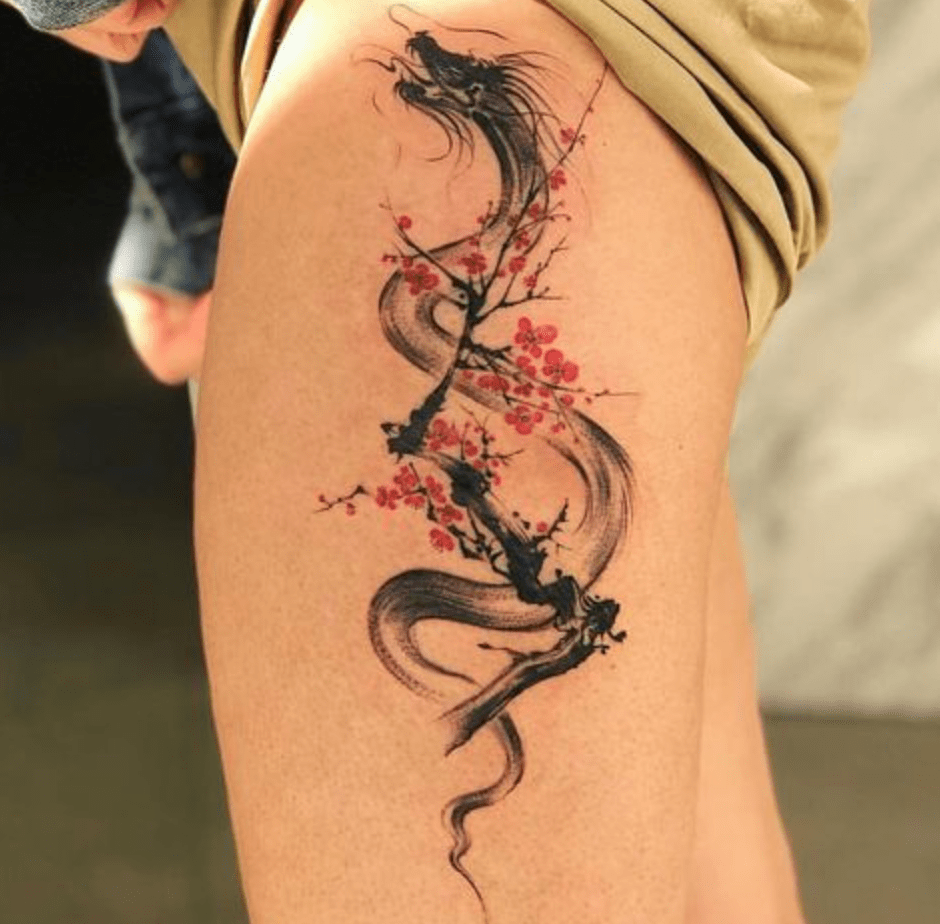
Fuku-Riu Tattoo:
The fuku-ryu, a benevolent dragon, represents good luck and happiness. Its gentle nature and association with positive energies make it a popular choice for those seeking auspicious qualities.
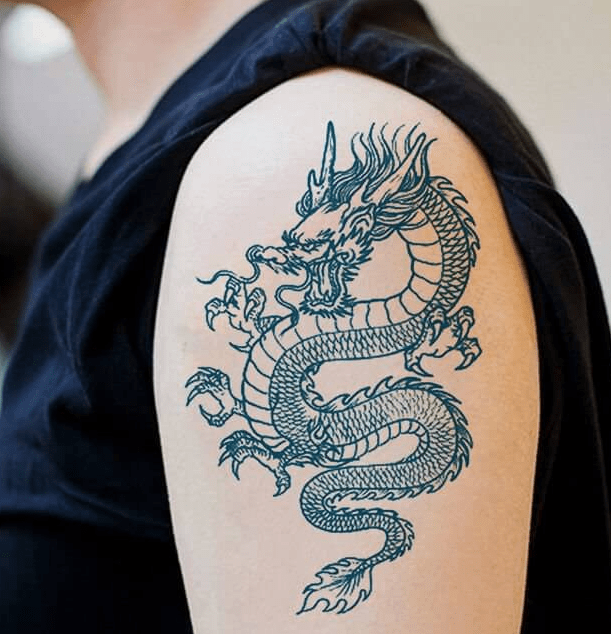
Mythical Beasts with Dragon Elements:
These tattoos combine dragon features with other mythical creatures like the phoenix or tiger. Each fusion carries unique symbolism, reflecting a personalized blend of virtues and attributes.
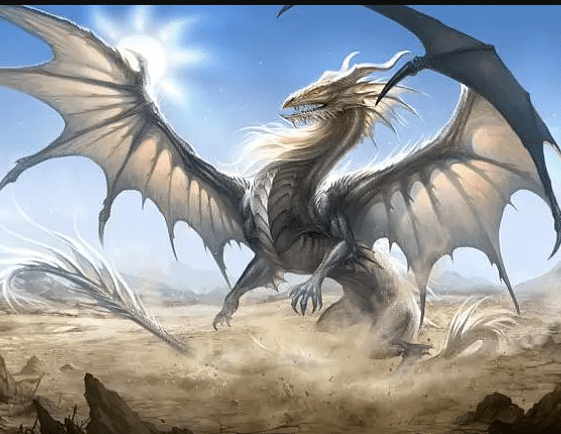
Ryu Tattoo (Tatsu):
The ryu, also known as tatsu, is a quintessential Japanese dragon meaning tattoo. With its elongated body, antler-like horns, and jewel-adorned chin, the ryu symbolizes power, wisdom, and protection. It’s often portrayed as a water deity, embodying blessings and prosperity through its connection to rain and water-related elements.
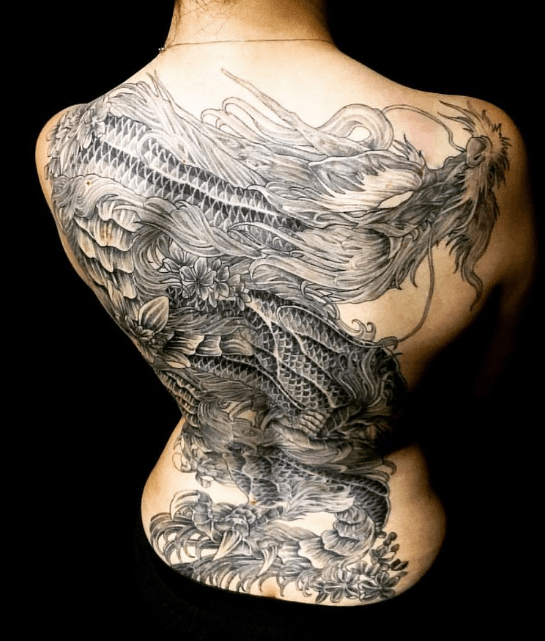
Koi Dragon Tattoo:
Combining the strength of the dragon with the determination of the koi fish, this tattoo represents transformation and perseverance. The koi’s journey upstream to transform into a dragon at the fabled Dragon Gate waterfall is a metaphor for overcoming obstacles and achieving one’s goals.
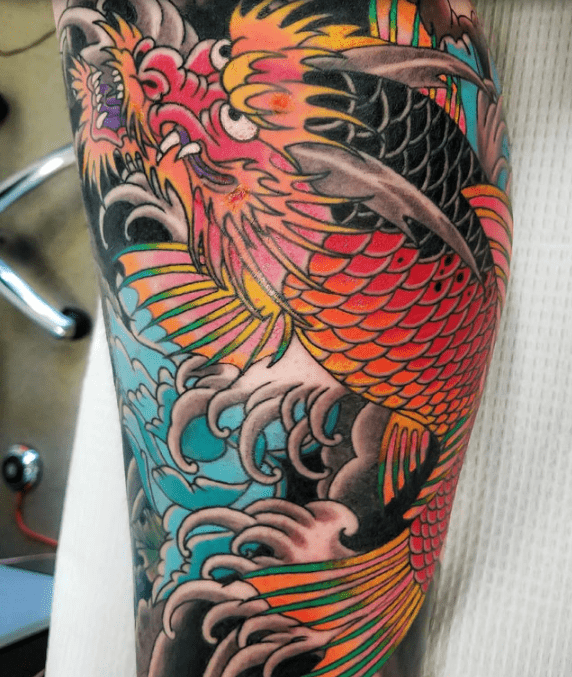
Oni Ryu Tattoo:
The oni ryu tattoo showcases the epic battle between a dragon and an oni, a demon or ogre in Japanese folklore. Symbolizing the struggle between good and evil, this design captures the theme of triumphing over adversity.
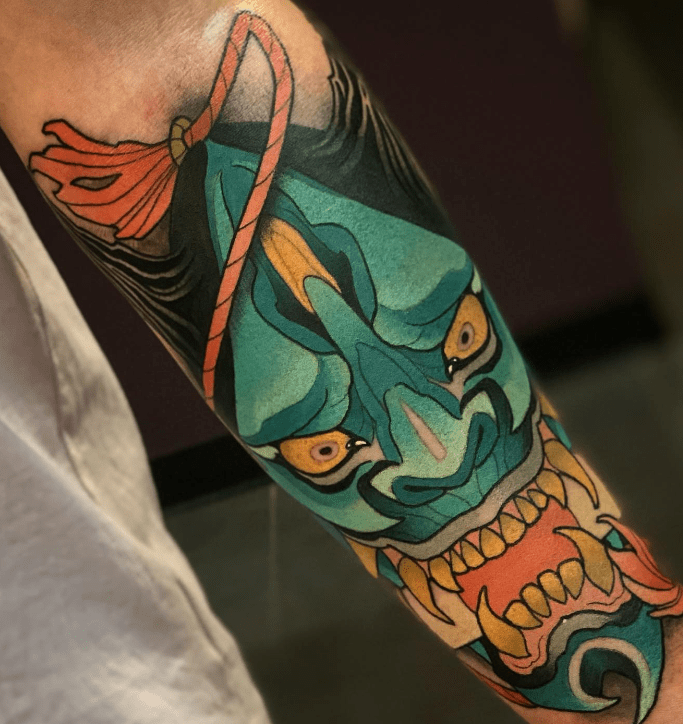
Han-Ryu Tattoo:
The han-ryu, a fusion of human and dragon elements, signifies unity and balance between opposing forces. This tattoo encapsulates the harmonious coexistence of the human and divine within oneself.

Suiko Tattoo:
Representing water dragons, the suiko is associated with rivers and oceans, embodying abundance and fertility. The suiko’s connection to rain and water-related blessings makes it a potent symbol of prosperity and protection.
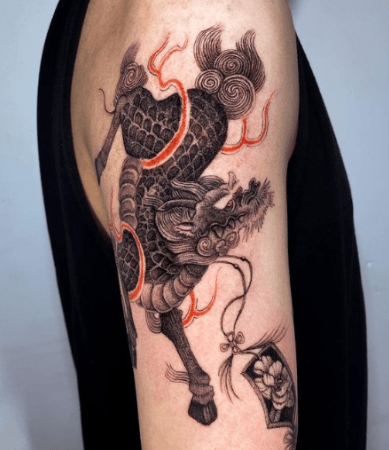
Karyu Tattoo
The karyu, or fire dragon, is a portrayal of fierce power and transformation. Often depicted with flames, it symbolizes destruction as a precursor to renewal and change.
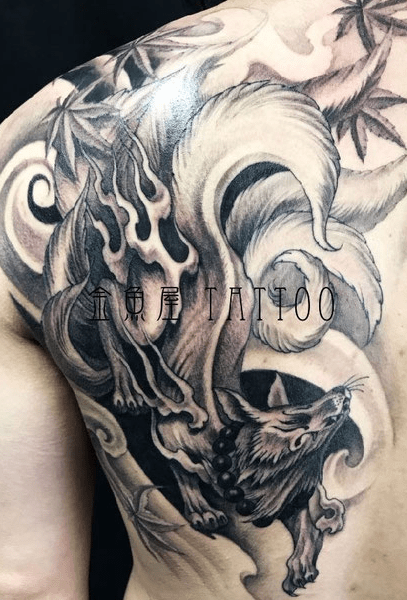
Chu-Ryu Tattoo:
The chu-ryu tattoo focuses on a medium-sized dragon and is linked to guardianship and protection against malevolent forces. This design is a symbol of security and watchfulness.
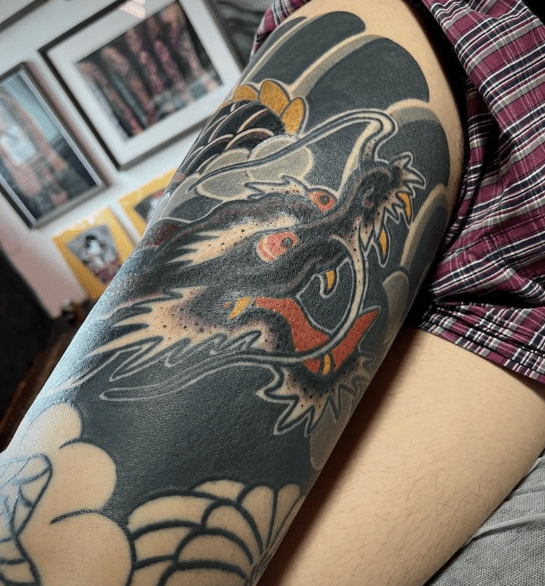
Japanese Dragon Leg Tattoos:
These tattoos provide a dynamic canvas for intricate dragon designs, symbolizing power and progress.
Japanese Dragon and Koi Fish Tattoo:
This fusion captures the journey of the koi fish transforming into a dragon, signifying personal growth and metamorphosis.
Traditional Trad Japanese Dragon Tattoo:
Rooted in centuries of tradition, this tattoo showcases the classic elements of the ryu or tatsu, embodying cultural values and symbolic significance.
Female Japanese Dragon Tattoo:
Tailored to feminine aesthetics, these tattoos often incorporate graceful lines, softer colors, and a fusion of dragon symbolism with elements like flowers or waves.
Japanese Dragon Sleeve Tattoos:
Spanning the length of the arm, sleeve tattoos provide ample space for intricate depictions of dragons, enabling artists to create detailed narratives.
Japanese Yakuza Dragon Tattoo:
A part of the Yakuza’s visual identity, this tattoo signifies affiliation, status, and strength within the criminal underworld.
Celtic Dragon:
In Celtic lore, dragons symbolize both guardianship of treasures and connections between earthly and spiritual realms.
Japanese Dragon Head Tattoos:
Focusing on the dragon’s head, these tattoos emphasize its powerful visage and intricate features, often highlighting its wisdom and strength.
Japanese Dragon Back Tattoos:
The expansive canvas of the back allows for breathtaking dragon designs that embody protection, transformation, and balance.
Japanese Dragon Chest Tattoos:
These tattoos are strategically placed over the chest, symbolizing strength and guarding the heart, while showcasing the dragon’s regal presence.
Japanese Dragon and Tiger Tattoos:
Combining two iconic creatures, this tattoo fuses the dragon’s wisdom with the tiger’s courage, creating a balance of yin and yang energies.
Japanese Dragon Neck Tattoo:
Adorning the neck, this tattoo demands attention and often represents protection or guidance throughout life’s journey.
Eastern Dragon:
Eastern dragons, including those in Japanese culture, often feature long serpentine bodies, multiple claws, and diverse symbolism.
Popular Dragon Tattoo Styles:
Popular dragon tattoo styles include traditional, realistic, neo-traditional, watercolor, and black and gray, allowing for various artistic interpretations.
Small Japanese Dragon Tattoo:
Despite their size, small dragon tattoos encapsulate powerful symbolism, making them a discreet yet impactful choice.
Chinese Dragon:
In contrast to the Japanese dragon, the Chinese dragon often embodies benevolence, strength, and imperial power in Chinese culture.
Japanese Dragon:
Rooted in Japanese mythology, the Japanese dragon is a water deity associated with protection, wisdom, and blessings.
Vietnamese Dragon:
In Vietnamese culture, the dragon is revered as a divine creature representing power, prosperity, and sovereignty.
Japanese Dragon Shoulder Tattoo:
Placed on the shoulder, this tattoo embodies guardianship, offering a visually striking representation of protection.
Blue Japanese Dragon Tattoo:
Representing water elements, blue dragon tattoos embody tranquility, fluidity, and adaptability.
Green Japanese Dragon Tattoo:
Evoking the verdant beauty of nature, green dragon tattoos symbolize growth, renewal, and harmony.
Japanese Dragon and Phoenix Tattoo: Pairing the dragon with the phoenix represents the union of opposing forces, symbolizing rebirth, balance, and transformation.
Why Peoples Love To Have Dragon Tattoos on Their Body?
People are drawn to Japanese dragon tattoos for a multitude of reasons, each reflecting the personal significance and meanings that these tattoos hold. Here are some of the common motivations behind the popularity of Japanese dragon tattoos:
- Symbolism and Meaning: Japanese dragon tattoos carry a rich tapestry of symbolism, representing attributes such as strength, wisdom, protection, transformation, and resilience. Individuals often resonate with these qualities and seek to embody them in their own lives.
- Cultural Connection: Japanese culture is steeped in tradition, mythology, and aesthetics. People are captivated by the allure of Japanese folklore and the deep-rooted symbolism of dragons, connecting them to a culture that values history and spirituality.
- Aesthetic Appeal: The intricate and dynamic design of Japanese dragon tattoos appeals to those who appreciate fine art and attention to detail. The sinuous curves, elaborate scales, and vibrant colors create a visually striking and captivating image.
- Personal Transformation: Just as the koi fish transforms into a dragon in mythology, people often see the dragon as a symbol of personal growth and transformation. A Japanese dragon tattoo can serve as a reminder of their journey and the challenges they’ve overcome.
- Strength and Empowerment: Dragons are associated with power and might, making them a suitable choice for individuals who want a tattoo that reflects their inner strength and ability to overcome obstacles.
- Spiritual Significance: For some, Japanese dragon tattoos hold spiritual or mystical meaning. The dragon’s connection to water and the divine realms can resonate with those seeking a deeper spiritual connection.
- Protection and Guidance: The guardian aspect of dragons can be comforting to individuals who view their tattoo as a source of protection or guidance in their lives.
- Individuality: Japanese dragon tattoos allow for creative customization, enabling wearers to choose designs that reflect their personality and unique story. This sense of individuality is important for many tattoo enthusiasts.
- Confluence of Cultures: The popularity of Japanese dragon tattoos extends beyond Japan’s borders. People from various cultural backgrounds are attracted to the intricate designs and meaningful symbolism, creating a cross-cultural appreciation.
- Conversation Starter: Japanese dragon tattoos often garner attention and curiosity due to their intricate details and historical significance. This can lead to conversations about culture, mythology, and personal stories, providing wearers with a chance to share their perspectives.
- Fashion and Style: In the world of body art, Japanese dragon tattoos are known for their captivating aesthetics. People who value tattoos as a form of self-expression and fashion may choose these tattoos for their distinctive look.
- Legacy and Enduring Art: Tattoos are permanent expressions of art on the canvas of the human body. Japanese dragon tattoo sleeves hold a timeless quality, allowing wearers to carry a piece of art that tells a story for generations to come.
Pros of Japanese Dragon Tattoo:
- Self-Expression: Tattoos serve as a form of self-expression, allowing individuals to showcase their personality, beliefs, values, and life experiences through body art.
- Memories and Milestones: Tattoos can commemorate important life events, memories, relationships, or milestones, serving as a permanent reminder of meaningful moments.
- Artistic Expression: Tattoos are a unique and artistic way to display creativity and individuality. Many people view their bodies as a canvas for artistic designs and meaningful symbolism.
- Cultural and Personal Identity: Tattoos can reflect one’s cultural heritage, offering a visual representation of one’s background and affiliations. They can also convey personal identity and ideologies.
- Conversation Starters: Tattoos often spark conversations and interactions, allowing individuals to share stories, experiences, and emotions associated with their body art.
- Empowerment: For some, tattoos can be empowering, symbolizing a sense of control over one’s body and decisions. They can boost confidence and self-esteem.
- Fashion Statement: Tattoos can enhance one’s fashion style, complementing clothing choices and adding an extra layer of uniqueness to one’s appearance.
- Permanence: The permanent nature of tattoos can be appealing, as they are enduring reminders of certain times, emotions, or personal mantras.
- Sense of Belonging: Certain tattoos, like those related to fandoms, groups, or causes, can foster a sense of belonging and connection within communities.
Cons Japanese Dragon Tattoo
- Pain and Discomfort: Tattooing involves a level of pain and discomfort, varying based on the individual’s pain tolerance and the location of the tattoo.
- Permanent Decision: Tattoos are permanent, and while some people appreciate this aspect, others may regret their choices over time. Tattoo removal can be expensive and time-consuming.
- Social and Professional Impact: Visible tattoos may lead to judgment, discrimination, or hinder job opportunities in certain industries or cultures that have conservative views on body art.
- Health Risks: Poorly executed tattoos or unsanitary practices during the tattooing process can lead to infections, allergic reactions, or other health complications.
- Aesthetic Changes: As the skin ages and changes over time, tattoos can fade, blur, or lose their original vibrancy, altering their appearance.
- Regret and Trends: Personal tastes and trends change, and tattoos that were once meaningful might lose their significance or appeal over the years.
- Financial Investment: High-quality tattoos can be expensive, and larger or more intricate designs can require multiple sessions, adding to the financial commitment.
- Prejudice and Stereotyping: Some individuals may face negative assumptions or stereotypes based on their tattoos, affecting their interactions with others.
- Allergies and Sensitivities: Certain tattoo pigments may trigger allergic reactions or sensitivities, causing discomfort or health issues.
- Limited Tattoo Removal Options: While tattoo removal technology has advanced, complete removal of tattoos can be difficult, expensive, and may not always yield satisfactory results.
Frequently Asked Questions:
What does a dragon tattoo meaning japanese?
Meaning of Japanese dragon tattoo can symbolize various virtues, including strength, wisdom, protection, transformation, and adaptability. It’s also associated with water-related blessings and prosperity.
What does the Ryu tattoo mean and what does a dragon tattoo mean?
A Ryu tattoo, also known as Tatsu, represents a Japanese dragon and carries similar symbolism as other traditional Japanese dragon tattoos. It embodies power, wisdom, protection, and connection to water-related blessings.
Where is the best place to get a dragon tattoo?
The best place for a dragon tattoo depends on personal preference and the size of the design. Common locations include the back, chest, arms, and legs, as these areas offer ample canvas for intricate designs.
Is a dragon tattoo Chinese or Japanese?
Dragon tattoos can be found in both Chinese and Japanese cultures. Each culture has its own interpretations and symbolism associated with dragons.
Are dragons lucky in Japan?
Yes, dragons are often considered lucky in Japanese culture. They are associated with positive qualities and are believed to bring good fortune.
What religion is the dragon symbol?
Dragons hold symbolic significance in various religions and mythologies, including Chinese, Japanese, and European traditions. They are often seen as powerful and revered creatures.
Do Muslims believe in dragons?
Dragons are not a prominent part of Islamic beliefs. While Islamic teachings don’t specifically address dragons, they are more commonly found in other cultural and mythological contexts.
Is a dragon a Korean symbol?
Yes, dragons hold significance in Korean culture as well. They are seen as powerful creatures associated with nature and are considered symbols of strength and protection.
Is a dragon a lucky symbol?
In many cultures, dragons are indeed considered lucky symbols. They are often associated with prosperity, protection, and other positive attributes.
What color is dragon luck?
The color associated with dragon luck varies among cultures. In Chinese culture, red is often considered lucky and is associated with dragons.
What Colour are dragons?
Dragons are often depicted in various colors, including red, green, blue, black, and more. The color can carry different symbolic meanings in different contexts.
Which zodiac is good for dragon?
In Chinese astrology, the Dragon zodiac sign is most compatible with the Rat, Monkey, and Rooster signs.
What zodiac is Dragon born?
The Dragon is one of the 12 Chinese zodiac signs. People born in the Year of the Dragon are said to possess strong and dynamic personalities.
Is the dragon zodiac powerful?
The Dragon is considered one of the most powerful and auspicious signs in the Chinese zodiac, symbolizing strength, courage, and success.
Is the Dragon the luckiest?
The Dragon is often associated with good luck and prosperity in Chinese culture due to its positive attributes and symbolism.
What is the luckiest month to be born in?
The concept of lucky months can vary among cultures and belief systems. In some cultures, auspicious months might depend on astrological factors.
Which dragon is the king?
The “Dragon King” is a concept found in various Asian cultures, where the dragon is often associated with ruling over bodies of water and controlling weather.
Which zodiac year is the luckiest?
The concept of a “luckiest” zodiac year can vary. Each year has its own unique qualities and potential, influenced by individual beliefs and practices.
Which horoscope is rich?
The concept of wealth can be influenced by various factors, not solely dependent on zodiac signs. Success and prosperity can result from a combination of factors such as hard work, opportunities, and financial management.
Which zodiac is lucky in money?
Chinese astrology attributes financial luck to various zodiac signs based on their compatibility with the current year’s zodiac sign. However, luck in money also depends on personal efforts and circumstances.
Which zodiac signs are lucky in love?
Love and compatibility are complex and can’t be solely determined by zodiac signs. Different signs may have varying levels of compatibility depending on individual personalities and relationships.
Which zodiac loves deeply?
The depth of love can vary among individuals of any zodiac sign. Love is influenced by personal experiences, values, and emotional connections.
What zodiac signs are true love?
True love isn’t necessarily tied to specific zodiac signs. Successful and fulfilling relationships depend on mutual respect, understanding, and shared values.
Which zodiac is successful in love marriage?
The success of a love marriage depends on various factors beyond zodiac signs, including compatibility, communication, and shared goals.
What is the enemy of a dragon?
In some mythologies, dragons are depicted as adversaries of various other mythical creatures or heroes. However, their enemies can vary based on cultural narratives.
Who are the 8 dragon kings?
In some Asian mythologies, the “Eight Dragon Kings” are revered sea deities who govern different bodies of water and control elements like rain and tides.
What is a good luck dragon?
Dragons are often associated with good luck due to their positive symbolism of strength, protection, and prosperity in many cultures.
Is a dragon a good symbol?
Dragons can be seen as both positive and negative symbols depending on cultural context. In many cultures, they represent strength, power, and wisdom.
Which year is lucky for the dragon?
Luck in a specific year can be influenced by various factors beyond just the zodiac sign. Each individual’s luck is a combination of personal efforts and circumstances.
Is a water dragon lucky?
In Chinese astrology, Water Dragons are considered fortunate due to the positive influence of the Water element, associated with flexibility and adaptability.
What is Earth dragon?
In Chinese astrology, the Earth Dragon refers to those born in a Dragon year with the Earth element. Earth Dragons are seen as stable, practical, and grounded.
Are fire dragons lucky?
Fire Dragons in Chinese astrology are associated with strong personalities and high energy. Their luck can depend on various factors, similar to other zodiac signs.
Which dragon is good for home?
Dragons are often considered auspicious and protective symbols, making them suitable choices for home decor in many cultures.
What attracts a dragon?
In mythology, dragons are often attracted to precious treasures, gems, and sources of power. They are also drawn to their natural elements like water.
What is the most powerful kind of dragon?
The perception of the most powerful dragon can vary among different mythologies and cultures. Some dragons are associated with immense strength and control over elements.
Who is the strongest dragon in house?
The concept of a “strongest dragon” can vary among different mythologies and stories. Dragons are often depicted as powerful and influential creatures.
Which is the most beautiful dragon?
Beauty is subjective and can be depicted differently in various artistic interpretations of dragons.
Conclusion
Intricately woven into the fabric of Japanese culture, the dragon tattoo is a vessel of history, symbolism, and personal empowerment. Its rich tapestry of significance resonates with those seeking to embrace change, protect their path, and embody the virtues symbolized by the mythical creature. As the dragon transcends time and space, its allure persists, proving that the art of tattooing serves not only as a means of self-expression but also as a connection to the ancient threads that weave us all together.
